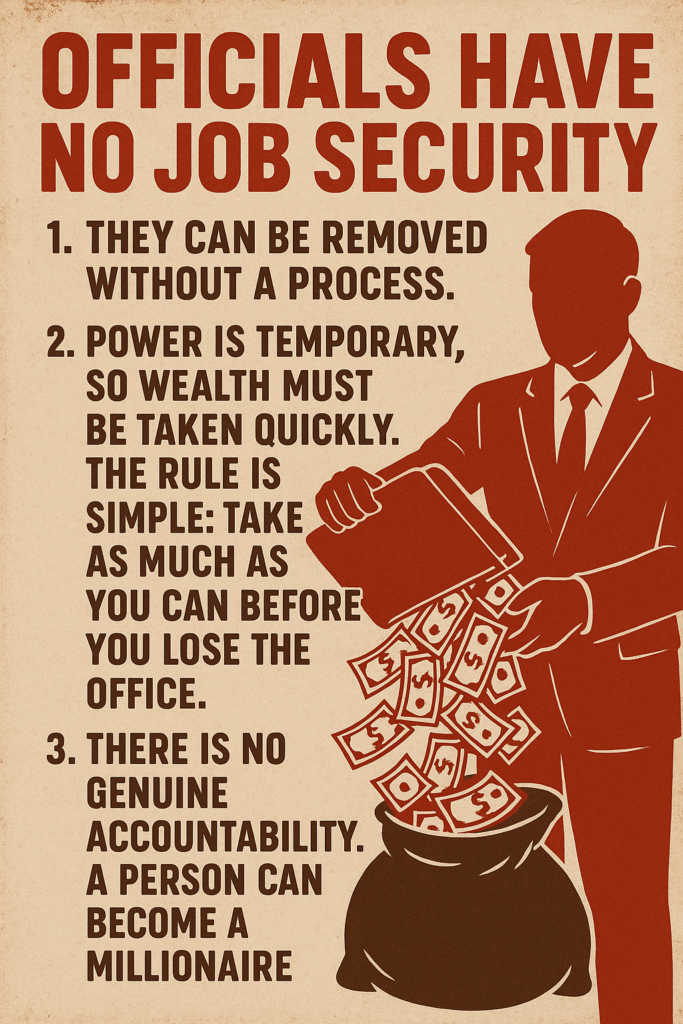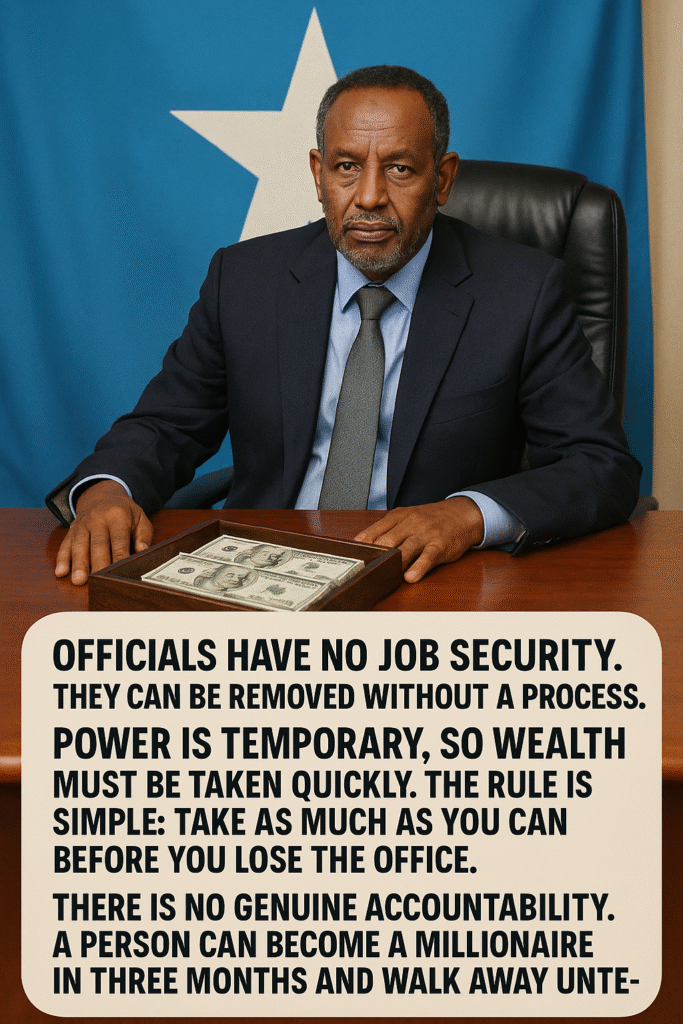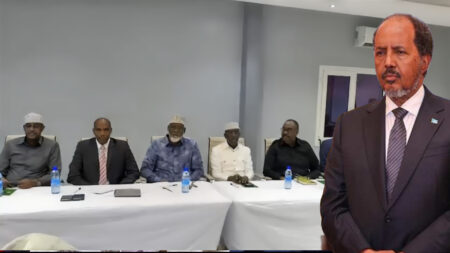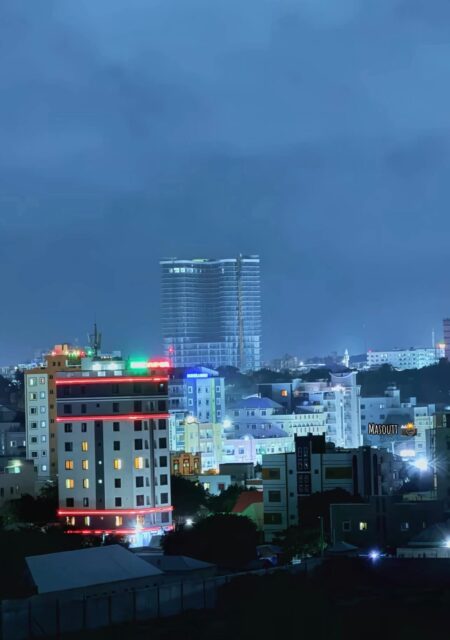Mogadishu is the political capital and economic centre of Somalia, yet its residents endure the highest level of financial extraction, restricted movement, and institutional exploitation in the country. They pay federal taxes, municipal fees, and additional compulsory charges through private companies controlled by political actors. Instead of public resistance, a large part of the population has adapted to the system and even defends it. This is the result of long-term psychological conditioning under a structure of power that normalises abuse as daily life.
2. The Normalisation of Exploitation
When residents are asked why they accept this situation, the answer often begins with: “Things were worse before. Remember 2017 and 2018. At least now security has improved.” This response shows how people defend the system that harms them, simply because it is not as bad as it was in a previous period. Abuse becomes acceptable when it is compared to a worse version of itself. That is not a sign of progress but of public exhaustion.

3. The Illusion of Political Change
Many citizens also argue: “The opposition is no different. When they were in power, they did the same.” This is true. Whether in office or in opposition, every political group has repeated the same behaviour: use state institutions for private gain, protect networks of loyalty instead of law, and silence public anger by promising stability. This is not leadership. It is the management of public disappointment.
Even if a new government replaces the old one, the core system remains unchanged because the political culture is built on impunity, not reform.
4. The Role of Private Companies in Public Corruption
The widespread use of companies to collect government-related money is not accidental. Three realities inside Somali governance drive it:
Officials have no job security. They can be removed without a process.
Power is temporary, so wealth must be taken quickly. The rule is simple: take as much as you can before you lose the office.
There is no genuine accountability. A person can become a millionaire in three months and walk away untouched.
If the top level is stealing, every level below copies the same behaviour. The checkpoint soldier, the ministry clerk, the department director, the state minister, and the national leadership all operate under the same unofficial rule: personal enrichment is allowed as long as you protect the chain above you.
5. The Result: An Endless Cycle of Abuse
The public pays.
Officials collect.
No one is held accountable.
Because corruption is the system, not the exception, the cycle continues. And because the people adjust instead of protest, the abuse becomes invisible, even acceptable.
6. A National Problem, not a Mogadishu Problem
Although Mogadishu suffers the highest visible impact, this is not a Mogadishu-only reality. It is the operating model of Somali governance at the federal and state levels. Every federal member state and every administration since the rebirth of the Somali republics has repeated the same structure: no institutional discipline, no financial accountability, and no separation between public office and private interest.
Until accountability reaches every level, from the desk of a director to the office of a minister, from the governor to the president, the system will continue to produce abuse, not governance.
The problem is not one leader.
Not one party.
Not one city.
It is a culture of impunity protected by power and normalised by public fatigue.
7. Breaking the Conditioning
Change will begin only when citizens stop comparing abuse to a worse version of abuse and start comparing it to the standard of dignity they deserve. The first act of liberation is naming the system for what it is, not what it pretends to be.
8. Conclusion: The Awakening That Cannot Be Delayed
Somalis are not powerless. They have been conditioned to believe they are. A population that pays the highest price in taxes, fees, bribes, and daily humiliation has been convinced that survival is an achievement, not a violation. That conditioning must end.
The public must stop measuring progress by comparing today’s injustice to yesterday’s chaos. The only objective standard is the dignity, rights, and services that every citizen is entitled to—not as a reward, not as charity, but as the lawful return on the power they gave the state. The government does not own the people. The people own the government.
Yet every time leadership changes, nothing changes. The faces change, the speeches change, the promises change, but the system remains the same. That is the most incredible illusion of reform in Somalia: the belief that replacing a politician replaces the problem. It does not. When the structure is corrupt, removing one person clears the chair for the next person to repeat the same abuse. Changing the actor without changing the system is not progress. It is the maintenance of the status quo.
If citizens continue to adapt, to stay silent, to apologise for their own suffering, then nothing will change. Corruption will not collapse on its own. Power will not reform itself. Those who eat from the system will never fix the system. Only the public can do that.
A society wakes up the moment it realises that obedience is not peace, and resignation is not stability. The people of Somalia must stop waiting for a saviour and start acting as the rightful owners of the republic. Every fee paid without legal basis, every public office used for private gain, every stolen dollar, every blocked right to participation is not a political issue; it is a theft from every citizen’s future.
The question is no longer whether the system is corrupt. Everyone knows it is. The real question is whether the people will continue to live inside a cage built from their own silence.
Somalia does not lack resources, intelligence, or opportunity. It lacks a population that believes they deserve better and demands it. The day the public refuses to accept exploitation as usual, the cycle breaks. Until then, the only thing that will keep changing is the nameplate on the office door.
This is the moment to stop surviving and start reclaiming.
Not tomorrow.
Not when “things get better.”
Now, because nothing will change until the people demand what is theirs, once and for all.





